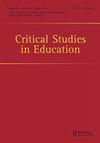Learning ‘in the hive’: social character and student wellbeing in the age of psychometric data
IF 2.7
2区 教育学
Q1 EDUCATION & EDUCATIONAL RESEARCH
引用次数: 3
Abstract
ABSTRACT Growing societal concern about a crisis in the wellbeing of young people has prompted a range of responses from governments and corporations, predicated on an ideal of the resilient, self-reliant individual. Behavioural economists, data scientists and educational technology companies now offer a variety of psychological interventions based on psychometric data, aimed at ‘equipping’ individual students with the necessary skills and character to enable them to withstand the pressures of contemporary life. As a consequence, the critical importance of mutually supportive interpersonal relationships continues to be neglected in mainstream approaches to Social and Emotional Learning (SEL). This article draws on Fromm’s theory of social character and Zuboff’s analysis of ‘life in the hive’ to challenge the assumptions about human behaviour underpinning data science and its application in digital tools for social and emotional learning and self-managed wellbeing. To improve students’ wellbeing, we need to begin with an understanding of why they are more likely to thrive within a network of mutually supportive social relationships than a digital ‘hive’.“蜂巢式”学习:心理测量数据时代的社会特征与学生幸福感
摘要社会对年轻人福祉危机的日益关注促使政府和企业做出了一系列回应,这些回应基于坚韧、自力更生的个人的理想。行为经济学家、数据科学家和教育技术公司现在根据心理测量数据提供各种心理干预措施,旨在“培养”学生个体必要的技能和性格,使他们能够承受当代生活的压力。因此,在社会和情感学习(SEL)的主流方法中,相互支持的人际关系的关键重要性仍然被忽视。本文借鉴了弗洛姆的社会性格理论和祖博夫对“蜂巢中的生活”的分析,以挑战支撑数据科学的人类行为假设及其在社交和情感学习以及自我管理幸福的数字工具中的应用。为了改善学生的幸福感,我们需要从理解为什么他们更有可能在相互支持的社会关系网络中茁壮成长开始,而不是在数字“蜂巢”中。
本文章由计算机程序翻译,如有差异,请以英文原文为准。
求助全文
约1分钟内获得全文
求助全文
来源期刊

Critical Studies in Education
EDUCATION & EDUCATIONAL RESEARCH-
CiteScore
10.10
自引率
5.10%
发文量
18
期刊介绍:
Critical Studies in Education is one of the few international journals devoted to a critical sociology of education, although it welcomes submissions with a critical stance that draw on other disciplines (e.g. philosophy, social geography, history) in order to understand ''the social''. Two interests frame the journal’s critical approach to research: (1) who benefits (and who does not) from current and historical social arrangements in education and, (2) from the standpoint of the least advantaged, what can be done about inequitable arrangements. Informed by this approach, articles published in the journal draw on post-structural, feminist, postcolonial and other critical orientations to critique education systems and to identify alternatives for education policy, practice and research.
 求助内容:
求助内容: 应助结果提醒方式:
应助结果提醒方式:


